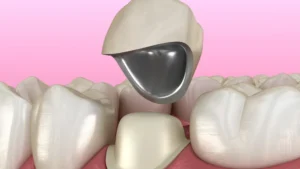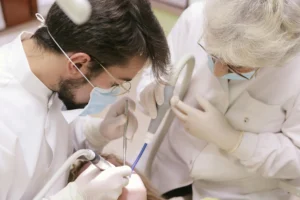Dental crown treatment can be a versatile solution for your damaged or weakened teeth because it will give you strength, durability, and aesthetic enhancement. Above all, just as there are pros and cons to everything, dental crowns also have some bad sides that can hinder your healthy teeth and you may have to deal with several problems in the future.
We will now know through this complete guideline what are the disadvantages of dental crowns. And why dental crowns are bad? Although here we will know only about the disadvantages it has both advantages and disadvantages of dental crowns. Our dental crown service is top-class in San Antonio TX.
Before knowing about the disadvantages of dental crowns, we must first know what dental crown is why it is used, and in which case it is needed.
What is a Dental Crown?
A dental crown is a tooth-shaped cap that is placed on decayed and damaged teeth, covering the entire visible portion of the tooth above the gum line. It helps maintain the shape, size, and strength of your decayed tooth. We understand how important your beautiful dental smile and optimal dental health are.

Why do I Need a Dental Crown?
There are several reasons why you might want a dental crown:
Protection: Dental crowns are used to guard weak or broken enamel from similar deterioration. If a tooth has a large cavity, significant decay, or is at risk of fracturing, a crown can provide reinforcement and save the teeth from breaking aside.
Restoration: Crowns are typically used to restore the shape, length, and characteristics of a tooth that has been extensively decayed, worn down, or damaged due to harm or trauma. By covering the entire part of the teeth above the gum line, a crown restores its structural integrity and lets it be characteristically used for biting and chewing.
Support: After undergoing a root canal technique, teeth may additionally become weakened due to the removal of their inner pulp tissue. In such instances, a dental crown is often located over the treated teeth to provide support and give a boost to it, reducing the chance of fracture and ensuring lengthy-term durability.
Cosmetic Enhancement: Dental crowns can also be used for cosmetic functions to enhance the advent of teeth. Whether it is discoloration, misalignment, or an abnormal form.
Bridge Support: Crowns are vital elements of dental bridges, which can be used to replace lacking teeth.
Related Keywords: The Top 8 Disadvantages of Teeth Bonding
The Disadvantages of Dental Crowns
Dental crowns, while highly beneficial in restoring damaged teeth, do have their limitations and potential drawbacks.
Here are some disadvantages to consider:
Cost
One of the disadvantages of dental crowns is that it is a bit expensive. In the case of dental crown treatment, you may need multiple teeth, also very high-quality materials are used in this treatment which includes porcelain or ceramic. If you can’t cover through your insurance then its cost can be a big obstacle for you which will give you an initial shock in getting this treatment.
Time-consuming Process
Another big problem with dental crowns is that it is a very time-consuming treatment procedure. Many other treatments are done in a single visit but dental crowns require multiple visits to the dentist. The tasks that are completed in the first visit include preparing the tooth, taking impressions, and placing a temporary crown. After this, you have to wait for a long time because during this time the permanent crown is fabricated in a dental laboratory. After this comes the final visit, in this final visit your permanent crown will be placed. It may take several weeks to complete this process which makes this treatment a time-consuming process.
Risk of Sensitivity
Some patients may feel temporary sensitivity or discomfort after getting this dental crown. It happens if the tooth’s nerve tissue is irritated during the preparation process. It causes a lot of trouble for the patients at first, although it resolves very quickly.
Potential for Complications
Various complications can occur during or after the treatment, although the most common side effects after dental crowns include allergic reactions to materials used in the crown, damage to the underlying tooth structure during preparation, or improper fit leading to discomfort or bite issues. In many cases, cement is used to make the crown bond to the tooth very well, but it can wash away over time, causing problems such as a loose crown.
Risk of Decay or Gum Disease
While crowns protect the underlying tooth from further damage, By protecting the hand, they don’t make the tooth invincible. If you do not maintain proper oral hygiene then bacteria may accumulate around the crown margin again, which will cause problems like decay or gum disease. Through regular brushing or flossing and dental including dental fillings, veneers, or inlays/onlays.

Q: Do dental crowns have any impact on adjacent teeth?
A: In some cases, preparing a tooth for a dental crown may involve removing a portion of the tooth structure. This can potentially impact adjacent teeth, although the extent of the impact depends on the individual case and the skill of the dentist. checkups, you can get rid of this problem.
Potential for Fracture or Breakage
Although it has very good strength and durability, dental crowns are not indestructible. A lot of pressure such as biting various hard objects or other reasons can cause a fracture or break in the crown. Although the risk is very low, we must always be careful to avoid various problems in the future because we know that its treatment is very expensive.
Aesthetics
Different types of modern dental materials offer excellent aesthetics, still, Some patients are dissatisfied with the appearance of their dental crowns because it does not match the color or shape of the natural teeth. However, this problem can be easily fixed by seeing a good dentist.
Conclusion
If you want to take dental crown treatment for your teeth then you should proceed with all the above-mentioned points in mind. This will help you get the right treatment while saving you money as well as helping you achieve healthy oral health. Still, if you want to know more then meet the doctors. Don’t miss out on essential insight – delve into the drawbacks of dental crowns now!
Relate Article: Our Most Common General Dentistry Procedures | San Antonio TX
FAQs
Q: Are there alternatives to dental crowns?
A: Depending on the specific dental issue, alternatives to dental crowns may

